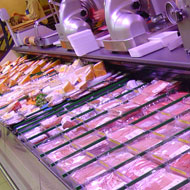NPA urges caution over new label on bacon

The new label informs consumers that pigs have have been ‘Raised without antibiotics’.
The National Pig Association (NPA) has raised concerns over a new label on bacon which informs consumers that pigs have have been ‘Raised without antibiotics’.
The label is backed by Alliance to Save Our Antibiotics (ASOA), but the NPA has warned that it ‘must not be used as a gimmick just to sell pork’.
The labels will appear in major retailers across the country on dry cured smoked back bacon, dry cured unsmoked back bacon and dry cured smoked streaky bacon.
Marketed by Spoilpig, the pork comes from RSPCA Assured pigs produced by Brydock Farms. Under the new system, pigs will only be given antibiotics when necessary. Treated pigs will be sold separately under a Freedom Food Label, but will not carry the antibiotic label.
“We have always believed this sort of labelling is inevitable in the UK but the key point from our point of view is that it must not be used as a gimmick just to sell a product,” commented NPA chief executive Zoe Davis.
“We are pleased that, in this case, animals can still be treated with antibiotics but we are concerned that consumers will be confused. We need to emphasise that all meat is antibiotic free – we must avoid any impression that by eating meat, consumers will somehow be exposed to harmful antibiotic residues.”
Spoilpig states that 85-90 per cent of the pigs raised received no antibiotics. The new system has been set up to ensure the pigs are not mixed in ages, which it said avoids illness though the benefits of a late weaning period.
ASOA said the initiative shows how major improvements in animal husbandry and welfare can ‘greatly contribute to reducing farm antibiotic use, while still delivering affordable meat.'
But the alliance stressed that it did not endorse ‘antibiotic-free’ meat labels and production systems, which have been seen in the US.
It said these can put animal health and welfare at risk when treatment is not provided when it is needed and that the term ‘antibiotic-free’ can mislead the consumer into thinking the main problem with antibiotics in livestock is the residues that end up in food.



 The BSAVA has opened submissions for the BSAVA Clinical Research Abstracts 2026.
The BSAVA has opened submissions for the BSAVA Clinical Research Abstracts 2026.